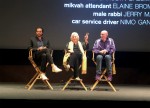Director Jeff Lipsky said his film would be provocative.
Throughout its two-hour runtime, “The Last” portrays a Jewish family shattered by their beloved nana Claire, the family matriarch’s confession to being a Nazi.
The film was screened Thursday evening at the James Bridges Theater at an event hosted by the Graduate Students Association and Melnitz Movies, followed by a live Q&A with Lipsky and the actress who plays Claire, Rebecca Schull. Paul Kurek, a graduate student in the Department of Germanic Languages, and director of Melnitz Movies, said they wanted to screen a socially relevant film because of the rising hate speech in today’s political climate. And as Kurek himself is German, he said he felt it was important to highlight this aspect of history.
“One might think that an event such as the Holocaust will forever be present in our memory, but the reality is that we forget very fast. And since the world is now taking a kind of radical turn … (toward right-wing thought), it’s even more important than maybe 20 or 40 years ago to keep this memory alive and to grapple with it,” he said.
The film considers the horrors of the Holocaust and concentration camps, as Claire reveals to her grandson and his wife that she is not Jewish, but was instead a nurse at Auschwitz, complicit in the death of many Jewish individuals. As the family’s Jewish lineage is exposed as a lie, her story is met with doubt. But she provides pictures and diary entries – kept in a safe for decades – that confirm she was a part of the Third Reich.
In revealing the truth, Claire recounts the tragic backstory of how she became indebted to a Nazi doctor and eventually emigrated to America disguised as a Jewish refugee. But rather than repent for the actions of the Nazi party, she bares her anti-Semitism. The character, who is first shown as a loving and innocent grandmother, becomes irrational and a proud supporter of the Nazi party, which Schull said came as a surprise to her when she first read the script.
“The fact that she was a Nazi when she was a girl, you can sort of understand how circumstances might have led her to become one because of the predicament that she was in,” Schull said. “But then, after she’s lived all these years as a Jewish woman, as a matriarch of a Jewish family, to still consider herself a Nazi and so virulently, openly anti-Semitic is the shocking part.”
Schull said she first had doubts about playing Claire – as a Jewish actress, the character’s motivations go against her religious and cultural beliefs. But she later learned to accept the character by understanding how the events of Claire’s life shaped her perspective. Particularly, by losing her mother at a young age, Claire became attached to a Nazi doctor who became her sole provider.
During the panel, audience members said they were conflicted on how to feel about Claire. Schull also said her friends were disturbed by how empathetic the character is shown to be. In response to this notion, Lipsky said he did not intend for Claire to be sympathized with, and viewers should ask themselves what they would’ve done given the situation she was in, as an orphan girl who had so few options.
During Claire’s last week of life, her family struggles to deal with their shattered heritage. The finale of the movie features a second twist, when Claire is killed by Olivia, her granddaughter by marriage, and seemingly her most ardent supporter. This left attendees conflicted. One student said that Claire, being a Nazi, got what she deserved. Other viewers argued that despite her past, she should not have been murdered in cold blood. Lipsky said this type of controversy is what he intended to spark and thanked an audience member who said they plan to watch the movie multiple times to fully grasp its nuance.
The director revealed at the event the characters were partly based off members of his own Jewish family. Specifically, the characters Josh and Olivia mirror his agnostic nephew and his new bride, who also converted to Judaism before the wedding. Because of her conversion to a modern Orthodox Jew, his niece became the most religious person in the family. The dynamic between the couple and their conflicting religious views is what sparked the idea for the film, which is meant to express the multilayered dimensions of what it means to be a family, Lipsky said.
“This is very much a movie about family in crisis. It’s about multiple generations of the family, … how this information is going to affect each of them and their lives together,” he said. “All four of the family members act in completely different ways, which to me is the most interesting aspect of it.”
